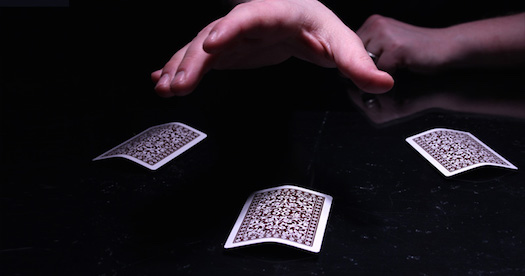“Three-card Monte” — also known as “Find the Lady” or the “Three-card Trick” — is the title of the fifth chapter of healthcare activist and journalist Steven Brill’s unfolding “docubook” on corporate behemoth Johnson & Johnson’s shell game of greed and justification with respect to the marketing of its antipsychotic medication Risperdal (risperidone).
A three-card-Monte is a card game in which, according to Wikipedia:
…”the victim, or mark, is tricked into betting a sum of money, on the assumption that they can find the money card among three face-down playing cards. It is the same as the shell game except that cards are used instead of shells.
In its full form, Three-card Monte is an example of a classic “short con” in which a shill (con person) pretends to conspire with the mark to cheat the dealer, while in fact conspiring with the dealer to cheat the mark.
This confidence trick was already in use by the turn of the 15th century.
Guess what? Five hundred years later, the Three Card Monte is still in play.
Here are a few highlights from Brill’s Chapter 5, which focusses primarily on J&J’s slights of hand with respect to studies demonstrating the connection between Risperdal and the growth of female breasts in boys:
- “You just have to have gotten past a third-grade math lesson in numerators and denominators to understand how this group of scientists from the world’s leading health care company and its hired-hand doctors distorted this series of complicated clinical findings and dense set of the data.”
- “Scholarly articles in medical journals always include an abstract at the top, so that doctors can glean the gist. The abstract of what would become known in court as ‘the Findling article’ declared, without qualification, “There was no direct correlation between prolactin levels and [the side effects associated with the growth of female breasts in boys].” In fact, the study in question clearly showed a significant correlation.
- “…the continuing flow of negative data from clinical studies did not make (it) seem likely (that Janssen would eventually secure FDA approval to include the treatment of responsive dementia behaviours on Risperdal labels). In March 2002 another study came in that showed not only a high incidence of strokes, but also that the drug was no more effective than a placebo in treating dementia.” (underline and italics mine)
- “(In August 2003, a J&J scientist wrote to his boss): ‘it is obvious to me, and others who may not be so bound and who have learned about the data, that this trial is on its face nearly completely negative. … Janssen has been sitting on the trial results for a long time. Yet it has a moral and ethical responsibility to publish quickly and in a way that can be understood. …'”
You can read Brill’s emerging book here, and my February 2014 poem on truth and lies here.
If you like what you’ve read, why not subscribe to my free updates?





It grows more sinister every day doesn’t it. Keep up the good work!
LikeLike
Indeed it does and yes I will 🙂
LikeLike